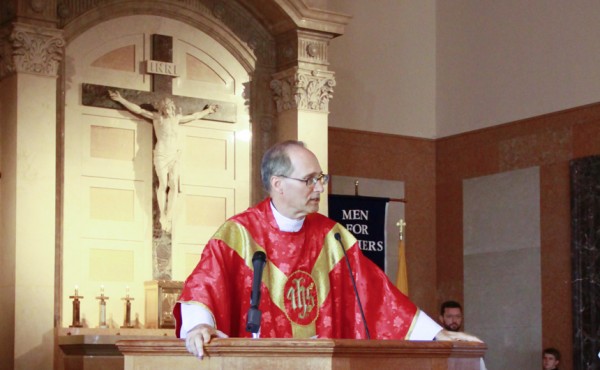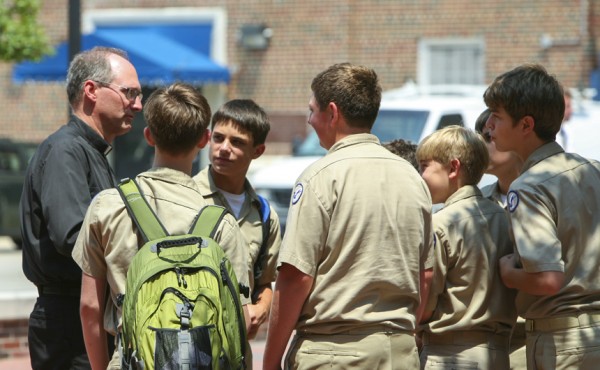Jesuit Remembers Fr. Raymond Fitzgerald, S.J.

Fr. Fitzgerald delivers the homily for the Mass of the Holy Spirit on the fear of the Lord in August 2013.
View an UPDATED Photo Gallery of Fr. Fitzgerald
The passing of Fr. Raymond Fitzgerald, S.J., gives the countless students, parents, faculty, and alumni who knew him the opportunity to reflect upon the tremendous gift that he has been to Jesuit High School, to the Church, and indeed to the world.
Much can be said about a man for whom the seven gifts of the Holy Spirit had become so ingrained in his being as to have become personality traits. Wisdom, understanding, counsel, knowledge, fortitude, piety, and fear of the Lord give a fairly comprehensive summary of the man. Had he more years as president of Jesuit, he would have finished preaching on them all at his homilies for the annual Mass of the Holy Spirit. And yet, his diagnosis with amyotrophic lateral sclerosis (ALS) did allow him to preach on these gifts – not from the pulpit, but through the powerful testimony of his life.
Since so much can be said, it would be best to focus on the three theological virtues of faith, hope, and charity as windows into the soul of this generous and holy priest of God.
Faith
Although Fr. Fitzgerald holds the place of “smartest man I’ve ever known” for most people who knew him, his faith in God was not the product of rational arguments drawn from his impressive intellect. Rather, his faith was born from an intimate friendship with Jesus. When he preached about Jesus, one had the impression that he was revealing the heart of a dear friend. His command of sacred scripture allowed him to speak with authority both from the pulpit and to the many people who sought his counsel in spiritual direction.
As a source of encouragement and strength to so many, he was once asked from where he drew his own strength, especially in the face of his diagnosis. After describing a series of letters sent back and forth between him and an old friend from the novitiate now living in Rome, he simply said that he would go have a chat with Jesus, who always gave him the grace he needed to face each day. He took literally the descriptor of the early Jesuits as companions of Jesus and understood his own life under that paradigm.
Hope
The heart of Fr. Fitzgerald overflowed with the theological virtue of hope. Although hope might not be the first virtue that comes to mind for a man who used a zombie apocalypse as the primary image in the homilies of his first year as president, Fr. Fitzgerald was teeming with hope. In every commencement address, he exhorted the graduates to the great hope of how good they could become under God’s providential care. That goodness, he told them, was not limited to their earthly life, but would spill out into eternity.
He thus concluded his final graduation address to the Class of 2014:
Just so, my beloved brothers, my prayer for you, for each of you, is that every deed whereby you change others for the good likewise changes you by bringing you closer to God. You leave Jesuit to write new pages in the books of your lives. May these also be new pages of the epics of God sharing his love and life with you, a saga wherein, in the words of C.S. Lewis, every chapter is better than the one before.
Fr. John Brown, S.J., one of the many lucky ones whose task it was to help Fr. Fitzgerald as his capacities weakened, remembers the only time he saw Fr. Fitzgerald weeping in the duration of his battle with ALS. Noticing tears in his eyes one night at dinner in the Jesuit residence, Fr. Brown asked him what was wrong. Fr. Fitzgerald said that he was thinking about just how good God was going to be when they would meet face to face after his earthly death. As good as Fr. Fitzgerald had known God to have been to him through his many years as a Christian, he was finding it a gift beyond imagining that God would be even greater still in heaven.

One of most important days on the Jesuit calendar for Fr. Fitzgerald was any ordinary day. Here he makes his most valuable contribution of spending time with students in 2011.
Charity
So many people cherish Fr. Fitzgerald and are saddened by his passing because of how greatly he loved anyone whom God had put in his path each day. He seemed to be a man almost incapable of malice. He saw his life as an extension of the work of the Holy Spirit, whose example he himself was able to recognize in his life of prayer which was guided by the Spiritual Exercises of St. Ignatius of Loyola.
Ignatius notes that for those trying to cleanse their soul from sin and rise in the service of God, “It is characteristic of the good spirit … to give courage and strength, consolations, tears, inspirations, and peace. This he does by making all easy, by removing all obstacles so that the soul goes forward in doing good.” Fr. Fitzgerald knew that the most important way to live the Gospel of Jesus on a daily basis was to bring out the best in others and to devote his life to encouraging others to do the same.
He lacked all duplicity. When people asked him how he was doing, he would say, “Better for seeing you.” He meant it. Every time he said it. When he announced his illness to 1,400 Blue Jays at morning assembly in January 2014, he told them that he was privileged to be at Jesuit at a time when he could find himself in the presence of saints as he walked the halls. These were no empty words. He was convinced that he walked among saints in greater numbers than one might suspect and that sainthood was truly how good his students were capable of becoming.
True can be said of Fr. Fitzgerald what a biographer wrote of St. Ignatius: “He was always rather inclined toward love; moreover, he seemed all love, and because of that he was universally loved by all. There was no one … who did not have great love for him and did not consider himself much loved by him.”
His Final Lesson
In that address to the students at morning assembly, he revealed to the Jesuit community the last lesson he would teach as the disease ran its course. He offered his personal witness to two items from the spiritual arsenal of St. Ignatius: the Principle and Foundation and the Suscipe prayer – the prayer “Take, Lord, receive.”
The latter serves most poignantly as a lens which reveals Raymond Fitzgerald as a priest, whose mission in life is to offer sacrifice to God. As the human faculties he had employed for God’s service fell into disuse, he would see each loss as offering back to God something with which God had blessed him in the first place. Imagine first his daily tasks of shaving or using keys to open doors. Think also of bodily comforts and necessities associated with eating and drinking. He incrementally was losing his capacity for speech, perhaps his most powerful instrument to glorify God. Especially consider his ministerial duties in consecrating the Eucharist or hearing confession.
Although he used the scientific means necessary to preserve functionality as long as possible, he saw each function as a gift from God, which he himself did not possess fully, and so, through God’s grace, was able to return them to God. He understood his identity not to be wrapped up in any task God had given him, what he would call a “secondary identity.” Rather he knew his primary identity to be a son of God, a gift which could be taken away neither by ALS nor by his eventual death.
It was the Principle and Foundation that guided him to this realization: “The purpose of our being here is to praise, reverence, and serve God our Lord. God gives us the means of doing this each day. Good or ill health doesn’t enter into it.”
Armed with this purpose, he approached his death with heroic virtue. He passed into the Father’s Kingdom on Sept. 17, 2016, on the feast of St. Robert Bellarmine by God’s good providence. When he was a novice at St. Charles College in the early 1980s, his Novice Master gave him St. Robert Bellarmine as his personal patron. More than thirty years later at this same St. Charles College, this same patron saint welcomed him home to eternal life. How marvelous it is to imagine Robert Bellarmine witnessing the Lord speak the line from Fr. Fitzgerald’s favorite Biblical passage to him: “Well done, my good and faithful servant. Since you were faithful in small matters, I will give you great responsibilities. Come, share your master’s joy” (Matthew 25:14-30).
St. Robert Bellarmine is also the patron saint of catechists. It is fitting that Raymond Fitzgerald, a good and faithful servant of God and teacher of the faith, taught his most powerful lesson, witnessing in his own death the Lord’s triumph over death itself.
This essay was written by Jeremy Reuther ’01, the director of communications who formerly served as campus minister from 2012 – 2016.
See News Releases on the Passing of Fr. Raymond Fitzgerald, S.J.
View the Full Video and Press Library of Fr. Fitzgerald, S.J.